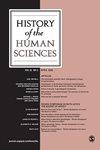公开调查弗洛伊德对剑桥的影响
IF 0.5
2区 历史学
Q2 HISTORY & PHILOSOPHY OF SCIENCE
引用次数: 1
摘要
不可否认,弗雷斯特和卡梅隆的《剑桥的弗洛伊德》只有700多页,是一本巨著。这让人想起公众调查产生的报告:政府为对特定事件或行动进行官方审查而设立的重大调查,通常带有建议(可能具有约束力,也可能不具有约束力)。因此,这是公众调查弗洛伊德对剑桥影响的最终报告,尽管弗洛伊德从未涉足剑桥。调查的目的是反驳弗洛伊德对剑桥的智力生活没有重大影响的说法,因此剑桥没有,也从来没有受到精神分析思想的魅力和诱惑。更重要的是,剑桥的弗洛伊德影响已经被遗忘、隐藏和(也许)被压抑。与任何公开调查一样,寻找弗洛伊德影响的证据需要法医的细心:不知疲倦地收集零星信息;小心地把碎片拼凑成一个连贯的整体;精心安排事件、行动、时间表和病理。没有一条线索太小而不容忽视。没有任何线索可供选择。这本书是不知疲倦的研究人员的作品,他们决心列出所有证据,使他们的结论无可争议。弗洛伊德在剑桥。他仍然是。公开调查现在已经结束——我们可以同意它的建议:智力影响并不总是可见或值得庆祝的,追踪它们需要毅力、决心和对细节的法医关注。还有创造力。创造力是的,弗雷斯特和卡梅伦对弗洛伊德影响的调查需要仔细收集有关主要人物的事实,并对其进行采访(尽管是在去世后)。然而,这本书也有另一个同源物:弗洛伊德自己的皇家本文章由计算机程序翻译,如有差异,请以英文原文为准。
A public inquiry into Freud’s influence upon Cambridge
Undeniably, at just over 700 pages, Forrester and Cameron ’ s Freud in Cambridge is a big book. It is reminiscent of the kinds of reports that are produced by public inquiries: those major investigations set up by governments to provide an of fi cial review of particular events or actions, often with recommendations (that can be binding, or not). This, then, is the fi nal report of the public inquiry into the in fl uence of Freud upon Cambridge, despite Freud never having set foot in Cambridge. The purpose of the inquiry is to counter the suggestion that Freud had no signi fi cant impact on the intellectual life of Cambridge – and therefore that Cambridge is not, and never has been, subject to the charms and seductions of psychoanalytic thought. More than this, the argument is that Cambridge ’ s Freudian in fl uences have been forgotten, hidden and (perhaps) repressed. As in any public inquiry, searching for evidence of Freud ’ s in fl uence requires the work of forensically attentive detectives: tirelessly gathering scraps of information; carefully assembling fragments into a coherent whole; meticulously laying out events, actions, timelines and pathologies. No clue too small to be overlooked. No lead to be left dangling. This book is a work of indefatigable researchers, determined to lay out all evidences, to make their conclusions incontrovertible. Freud was in Cambridge. And he still is. The public inquiry is now closed – and we can agree with its recommen-dation: that intellectual in fl uences are not always visible or celebrated, and tracing them out requires fortitude, determination and a forensic attention to detail. And also creativity. Creativity? Yes, the Forrester and Cameron inquiry into the in fl uence of Freud requires the careful gathering of facts about, and interviews with, leading fi gures (albeit posthumously). Yet this book also has another homologue: Freud ’ s own Royal
求助全文
通过发布文献求助,成功后即可免费获取论文全文。
去求助
来源期刊

History of the Human Sciences
综合性期刊-科学史与科学哲学
CiteScore
1.60
自引率
11.10%
发文量
31
审稿时长
>12 weeks
期刊介绍:
History of the Human Sciences aims to expand our understanding of the human world through a broad interdisciplinary approach. The journal will bring you critical articles from sociology, psychology, anthropology and politics, and link their interests with those of philosophy, literary criticism, art history, linguistics, psychoanalysis, aesthetics and law.
 求助内容:
求助内容: 应助结果提醒方式:
应助结果提醒方式:


